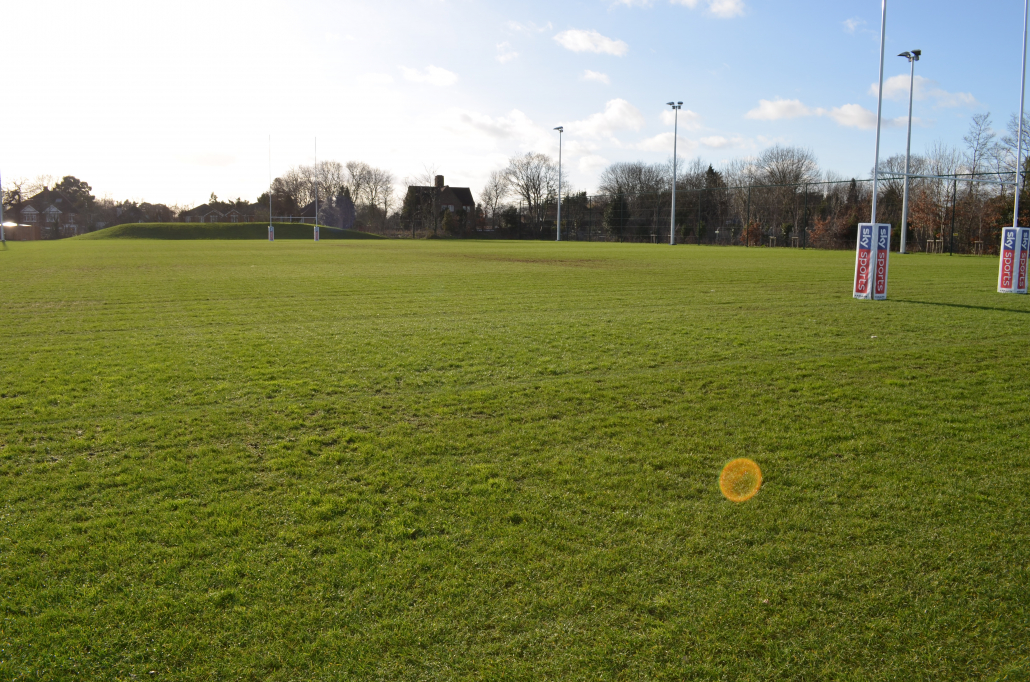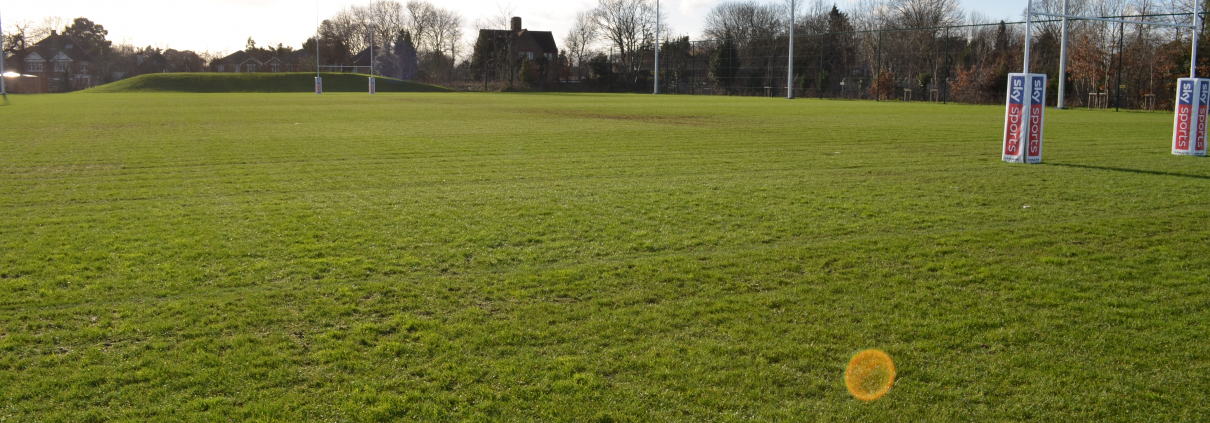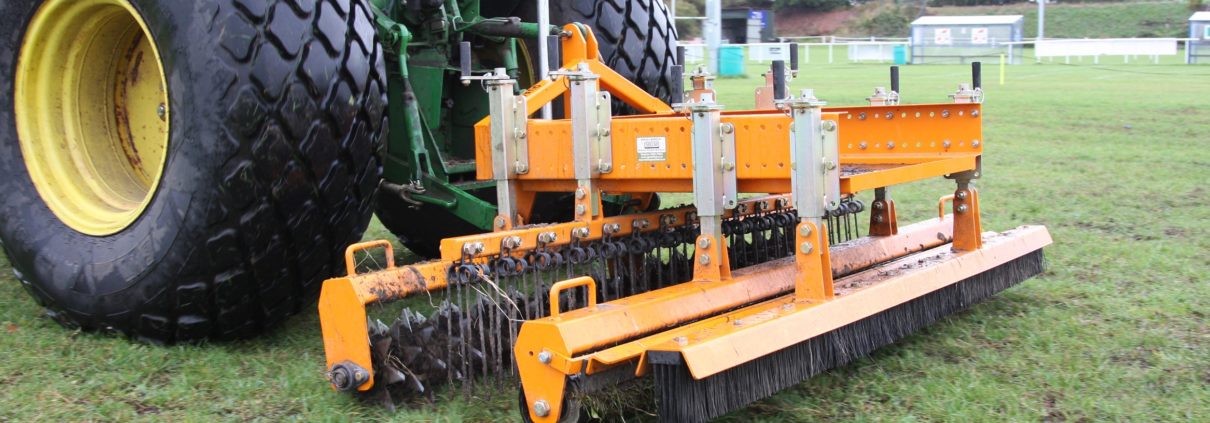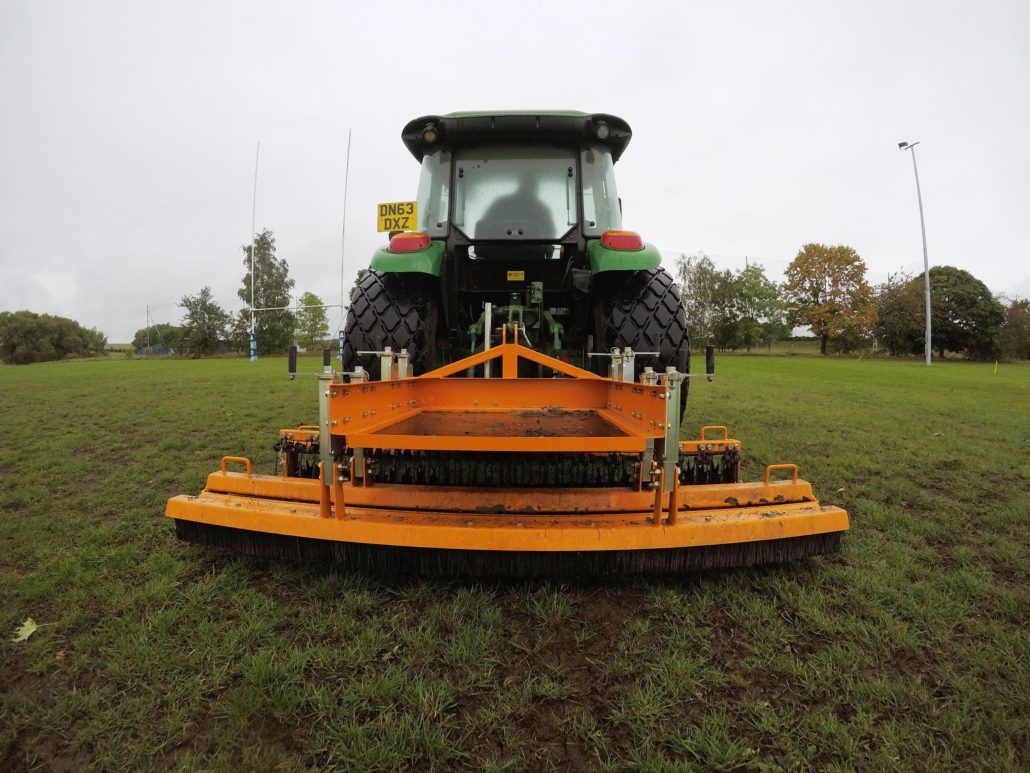Rigby Taylor at Grasshoppers RFC: When Rugby Union club Grasshoppers RFC moved into its new and impressive £11 million home in Osterley, West London, head groundsman Mark Woodward knew he had a job on his hands to bring the pitches up to the standard that he and the club were used to.
But drawing on his considerable groundscare experience –“I followed my father into the industry some 39 years ago; he was the former groundsman at neighbouring Centaurs RFC” – and with the input of Rigby Taylor’s technical representative, Corin Beeney, the playing surfaces at the Syon Lane site are continually being improved.

Rigby Taylor at Grasshoppers RFC
“First and foremost, the pitches were handed over to us in September 2018 and it was clear that the extreme weather of the preceding months – the cold from the Beast from the East then the very hot summer – had taken their toll on playing surfaces that effectively were newly-laid,” says Mark.
“Secondly, the pitches are sand-based. I’ve only ever maintained natural soil-based surfaces at the club’s former ground at Macfarlane Lane (a stone’s throw from the new site), so I had to travel a learning curve in the management of the new pitches in the sense of discovering exactly what they need in terms of irrigation and feed, for example, on a week-to-week and month-to-month basis in varying climatic conditions.
“This is where Corin has helped; he has a lot of experience of different types of pitches and together we are able to discuss and decide on the best ways forward. That’s been an ongoing process as the new pitches have ‘grown in’ and it will continue going forwards.”
Explaining that the club’s new facility (on local council-owned derelict land that was formerly a sports ground) was driven by the need to build new schools in the area (three new schools, in fact, as part of the Hounslow Schools Programme), Grasshoppers’ general manager Matt Gilmore says the ‘land swap’ has seen the club lose two grass pitches (now two instead of four) but gain a full-size 3G surface, which is also used for rugby among other things. All three pitches are floodlit.
“The council directed the complete building programme, which included the construction of the pitches [and an impressive clubhouse], and we were ‘given the keys’, so to speak, on 1 September 2018, with the first games on the grass pitches scheduled for eight weeks later. We knew the grass surfaces needed some work, so Mark instigated a maintenance programme that would give us the high quality of playing surfaces that not only we required but also of a standard that would attract semi-professional sports squads for training and matches.”
Included in Mark’s initiatives was a concerted programme of vertidraining. “I used to aerate perhaps just two or three times a year at the former ground plus regular in-house spiking, using a contractor, but it immediately became clear that we would need to vertidrain here a lot more often,” says Mark. With this in mind, the club has invested in its own vertidrainer.
Following a timetable of works instructed by the pitch consultant, Mark has also instigated the use of lots of sand – four applications in 14 months of up to 100 tonnes per pitch each time – “to bring the levels up”, he says, followed by generous overseeding with Rigby Taylor’s R140.
Designed for rapid establishment, as well as showing excellent tolerance to wear, cold, shade, disease and drought, for example, R140 is a mixture of perennial rye (Eurosport and Columbine cultivars) and tetraploid perennial rye (Fabian and Tetragreen) and is treated with Germin-8T which contains a speciality surfactant that is activated when the seed comes into contact with rootzone moisture. This provides effective penetration of water through the seeds’ outer layer (pericorp) into the endosperm, by lowering the surface tension of the surrounding water molecules. Roots can also take advantage of the micronised mycorryhizal fungi that will deliver long-term plant benefits.
The result is that at the active germination stage, each emerging seedling has immediate access to a highly beneficial package of targeted nutrients, biostimulants and micronised mycorrhizal fungi that together aid early establishment, improved root mass development and accelerated leaf extension.
“R140 does everything we want it to do,” adds Mark, “but going forwards I also want to introduce more creeping ryes and tetraploids to further improve the colour, root depth and surface density of the pitches.” In particular, because tetraploid rye grasses have double the number of chromosomes, including chloroplast for chlorophyll production, they exhibit high vigour and are extremely stress-tolerant plants.”

Rigby Taylor at Grasshoppers RFC
The sward is currently kept at 50 mm high – “though I will no doubt reduce the height of cut to 40 mm,” says Mark – mainly to help accommodate the high usage rates of eight-ten hours each week on each pitch (the 3G surface is used every day). The site is not only used by Grasshoppers’ 18 teams, including women’s and girls’ squads as well as juniors and minis plus a senior side that competes in the London 2 North West League, but it is also hired out to local schools and clubs, for example, to enable the club to maximise revenue streams. Indeed, in addition to the sports facilities available, the clubhouse is also vigorously promoted for hire.
Rigby Taylor fertilisers are also part of Mark’s maintenance programme, with a liquid ‘topping up’ feed applied monthly, including Cold Start which provides turf with nitrogen in cold conditions, in conjunction with a rapid colour boost.
Effective at temperatures of 5 degrees C, Cold Start has a nitrate and high iron content, as well as magnesium for increased colour. It also includes zeolite to reduce leaching and improve cation exchange capacity. There are three-fold benefits of the use of magnesium compared to formulations containing just nitrate and iron. Magnesium allows the plant to take up nitrate when it is photosynthesising, even at cold temperatures, naturally provides colour and increases the plant’s ability to utilise iron.
“I’ve used Rigby Taylor products for the past 10 years or so,” says Mark, “and have always found them to be effective and value for money. That includes the Impact paint, which I use on a Glider spray line marker.”
Glider can accommodate two 10-litre packs of the ready-to-use Impact paint. This provides bright, white line that lasts, and because it is a ready-to-use formulation, there is no mixing, no measuring no pouring and no added water. The operator has virtually no contact with the paint since a flow tube is simply inserted into the paint container.
“Importantly, too, I have a very good relationship with Corin and this continually proves to be fruitful in determining what these pitches need to thrive and therefore improve. Corin and I discuss many pitch issues and he is always available by ‘phone, which I find extremely useful, too.
“Working together – and, of course, closely with Matt over the management of pitch usage! – it’s a case of continual improvement in the appearance and performance of the pitches and the treatment they get,” says Mark.
For the latest industry news visit turfmatters.co.uk/news
Get all of the big headlines, pictures, opinions and videos on stories that matter to you.
Follow us on Twitter and Instagram for fun, fresh and engaging content.
You can also find us on Facebook for more of your must-see news, features, videos and pictures from Turf Matters.
















